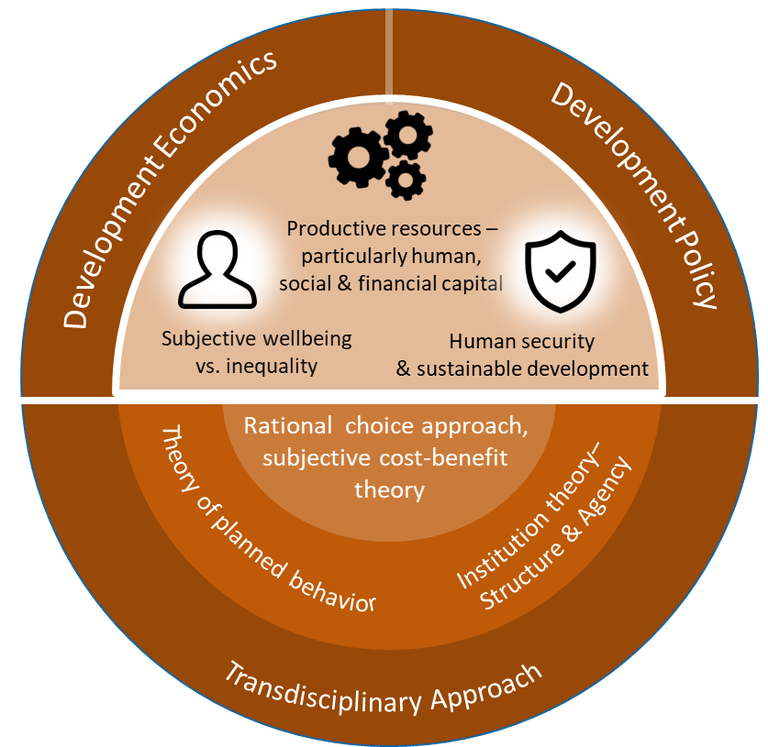Research
Main research areas
- Multidimensional poverty and social inequality
- Institutions and socio-economic development
- Microfinance
- Migration, flight & sedentariness
- Human security and development
List of current and completed DFG-funded research projects
Examples for completed research projects
Universität der Bundeswehr München:
DFG project (2019-2023): "„Perceptions of Inequality through Social Comparisons and Their Effects on Subjective Well-Being: A Micro-Study on Reference Groups" (BU 1319/22-1)
Research project: “Refugees from the Central African Republic in Eastern Cameroon: Human security of refugees and citizens of host communities in the context of assistance provided by humanitarian organizations “, 2019-2021, Universität der Bundeswehr München, ICT Universität in Yaoundé, Cameroon.
fiat panis Foundation, Ulm:
Research project: “Bridging the food and nutrition gap for hunger and poverty reduction. Understanding the dynamics and institutional framework for bushmeat in Cameroon”, 2010-2012, Universität der Bundeswehr München.
7th Framework Program of the European Union:
Coordination and support action “Enlargement network for agripolicy analysis (AgriPolicy)”, 2008-2010, IAMO.
6th Framework Program of the European Union:
Coordinator: Specific Targeted Research Project “Structural change in agriculture and rural livelihoods (SCARLED)”, 2007-2010, (SSPE-CT-2006-044201), IAMO.
Joint Research Center (JRC)-Institute for Prospective Technological Studies (IPTS):
Tender “Sustainability of semi-subsistence farming systems in new Member States and acceding countries (S-Farm)”, 2007-2008, IAMO.
Sub-project 3.3 “Land and Water Property Rights, Natural Resource Management and Rural Credit Access” (jointly with Prof. Franz Heidhues & Prof. Binsheng Ke) in the Research Training Group (RTG) 1070 “Modelling Material Flows and Production Systems for Sustainable Resource Use in Intensified Crop Production in the North China Plain”, 2004-2008, Universität Hohenheim.
Eiselen Foundation (now fiat panis Foundation), Ulm:
“Risk Management for Sustainable Livelihoods of Farm Households in Northern Thailand“, 2004-2005, Universität Hohenheim.
Sub-project F2.2 “Risk Management of Farm Household in Northern Vietnam“ in the DFG-funded Collaborative Research Center (CRC) 564 “ Sustainable Land Use and Rural Development in Mountainous Regions of Southeast Asia“, 2003-2006, Universität Hohenheim.
Sub-project F2.1 Rural Finance and Sustainable rural Development in Northern Vietnam“ in the the DFG-funded Collaborative Research Center (CRC) 564 “ Sustainable Land Use and Rural Development in Mountainous Regions of Southeast Asia“, 2000-2003, Universität Hohenheim.
ACE-PHARE98 Program of the European Union:
Partner in “EU Accession in the Balkans: Policy options for diversification in the rural economy“, 2000-2001, University Hohenheim.
ACE-PHARE95 of the European Union:
“Romania – Rural financial market development for the small private farm sector”, 1996-1997, University Hohenheim.
Research profile
The research focuses on the social science-oriented investigation and explanation of fundamental socioeconomic problems such as poverty and human insecurity in developing and transition countries, especially in sub-Saharan Africa, Southeast Europe and Southeast Asia.
The scientific approach is problem-oriented and therefore transdisciplinary. The welfare theoretical basis is the rational choice approach, which is extended by approaches from political science (e.g., structural agency from neo-institutionalism), from behavioral economics (e.g., status quo bias from prospect theory), and from sociology (e.g., cognitive constructs from the theory of planned behavior) to generate reality- and action-based research results and insights.
Methodologically, (semi-)structured questionnaires lend themselves to theory-based empirical research in order to conduct quantitative statistical cause-and-effect analyses. Both cross-sectional samples and panel data are collected. Problem-oriented research, especially in the context of developing countries, also needs qualitative approaches, e.g. in-depth and group interviews as well as participant observation.
|
In general, the thematic research of the Chair of Development Economics and Policy is conducted in the context of the United Nations' "2030 Agenda for Sustainable Development". A special research focus is on the Sustainable Development Goal (SDG) 16 "Peace, Justice and Strong Institutions", as sustainable development appears impossible without peace and stability. The scientific approach is problem-oriented and therefore transdisciplinary. |
 |
Three thematic research strands are worth mentioning. The first is to improve access to and efficient use of productive resources, as they are fundamental to poverty reduction and sustainable development. The financial market is central because income poverty often results in lacking capacity to self-finance productive investments. Access to credit to remedy this shortage, however, is hindered by the lack of individual bankability. Research findings in the field of so-called microfinance can remedy this situation.
The relationship between poverty or between interregional income disparities of so-called human capital and intranational and/or international labor migration are well known. Much less attention has been paid to the question of why, in most regions of the world, the majority of the population remains in its place of origin, even if this place has economic and other, e.g. social and/or ecological disadvantages compared to other places. This gap in knowledge will be investigated by studying the intentions of economically active populations to stay in developing countries with high levels of domestic and international migration.
Another research topic is wellbeing and social inequality. Inequality can only be perceived relative to others within society, nationally and/or internationally. Therefore, social comparisons represent the direct link between the concept of inequality and the concept of subjective wellbeing. Although the importance of social comparisons within reference groups is beyond question, there is little empirical research on this. This gap will be addressed by surveying students in several countries and conducting an empirical case study of economic active individuals in Thailand.
Human security addresses two basic human entitlements, freedom from want and freedom from fear. The current "Global 2030 Agenda for Sustainable Development" and human security are closely related, although the latter was launched by the United Nations Development Program (UNDP) in 1994. Human security is a basic prerequisite for sustainable development and, among other things, eminently suitable for studying push and pull factors of migrant workers and (internal) refugees.